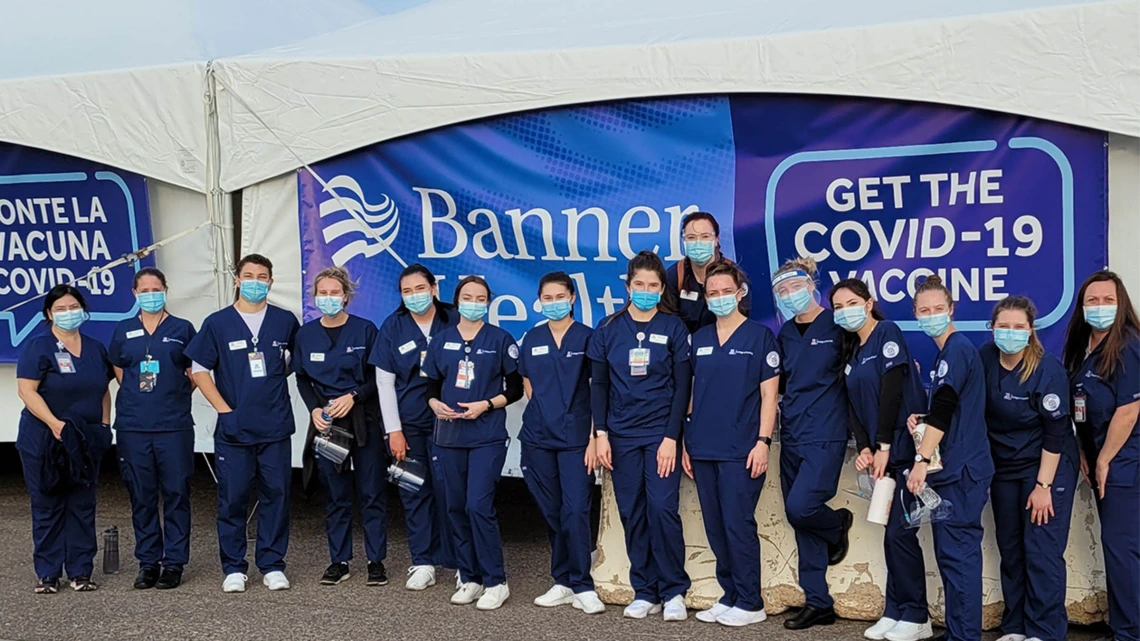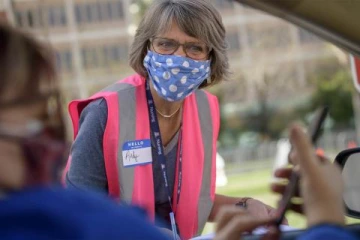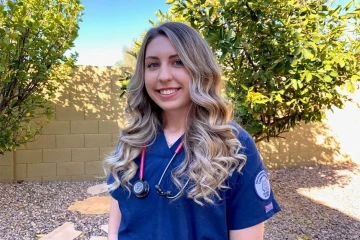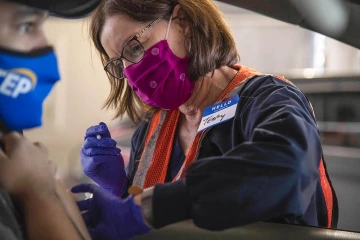Nursing Boosts Health Sciences Efforts to Get Shots into Arms
On the Health Sciences campus, the College of Nursing is a big part of the university’s COVID-19 vaccine roll-out.

BSN-IH Level 2 students assist in COVID-19 vaccination efforts in February 2021 at a Banner POD in Maricopa County.
As the University of Arizona rolled out its intensive vaccination plan in January, the College of Nursing played an essential role for UArizona Health Sciences in the Point of Distribution (POD) operations. When the University’s Incident Command System (ICS) team requested help, UArizona Nursing faculty, staff and students answered the call.

Development Director Andrea Fisher volunteers at a vaccination site.
Aiding the effort in Maricopa County is a crew of Level 2 Bachelor of Science in Nursing Integrative Health (BSN-IH) specialty students under the supervision of clinical instructors Tara Loghry, MSN, RNC-OB, C-EFM, and Jules Leverenz, MSN, ACNP. The students have been administering the Pfizer COVID-19 vaccine at the Banner vaccine clinic at Maricopa County Fairgrounds.
“It’s been fantastic to see their confidence grow as they have become more comfortable with injections,” said Leverenz, who estimates that students are administering between 10 and 30 injections on the day of their rotations. “Daily, the students recognize and love to discuss the importance of their role in this historic task of helping vaccinate a large patient population in helping to fight this pandemic. Banner, on average, has 1,700 to 1,800 vaccine appointments daily.”

Destiny Jones, Level 2 BSN-IH student
Undergraduate nursing student Destiny Jones works in the portion of the medical field that supplies individuals with equipment such as supplemental oxygen.
“I feel like we are finally starting to see some light at the end of this dark tunnel,” Jones said. “I talk to the patients that receive their vaccine and I can feel the impact this pandemic has had on each of them. Being at the COVID POD brings a feeling of relief after so much sickness and suffering.”
Essential to the effort is Lecturer Sherry Daniels, MS, MPH, RN, who was called in by the incident commander for the Campus Health task force to help with the management of the POD ops for COVID vaccine on campus. Thanks to her previous role as Pima County Health Department director, she still has contact with many of the department’s staff and leadership.
“Since I still have connections with the Mel and Enid Zuckerman College of Public Health, they reached out due to my leadership past and my experience running large-scale immunization events with Pima County: measles in 2008 and H1N1 in 2009,” she said.
“I feel like we are finally starting to see some light at the end of this dark tunnel.”Destiny Jones, College of Nursing undergraduate
Daniels is quick to point out that her efforts are part of a committed coalition of College of Nursing leaders, including graduates from the RN-MSN program like Sara Little and Karen Schwartz, both of whom now work for Campus Health and Wellness. She cites the importance of such diverse activities as managing the scheduling and registration of participants, training of personnel, screening, education and, above all, managing and administration of the vaccine itself.
“The nurse manager needs to reconcile vaccine usage, monitor adverse events, communicate with the state and other partners about operations, and plan for the next operational periods,” Daniels explained.
Although the registration process was initially beset by unpredictability as well as vaccine scarcity, the process has smoothed out since the efforts began. Also of great importance is logistics aid provided by UArizona Facilities Management and vaccination help from colleagues like Lecturer Kathleen Malkin, who has years of experience planning, implementing and evaluating large vaccination clinics while working with the Pima County Health Department.

University of Arizona College of Nursing Professor Terry A. Badger, PhD, RN, administers COVID-19 vaccine injections at the drive-through POD at the University of Arizona.
“I know the amount of planning, effort and resources needed to operationalize a mass clinic,” Malkin said. “The university has done a great job with this. I have found that the organizers are receptive to feedback on the ways to improve the clinic, and each week, things just get better and better. The people coming for their vaccines remark how organized things are and how smoothly things go.”
Daniels has high hopes for the future of the university’s broad vaccination efforts. She points out that the College of Nursing’s participation will be essential moving forward, as the POD will be operating until at least May.
“The community is nervous and anxious to get their shots,” she said, noting the importance of communication to both external and internal stakeholders in building a strong ICS structure. “We need more data collection for planning and long-term approaches to our target communities. The need for nursing resources will be critical and is deep and long term.”

